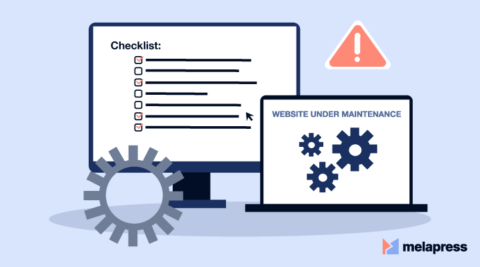Careful and consistent administration of a WordPress website can not only help you ensure happy visitors and users but ultimately more of them. However, many WordPress website owners are not in the business of managing WordPress websites.
With primary focus lying elsewhere (mainly on running the business), they tend to find this activity something of a black box that can take valuable time away from the core business. Fortunately, it doesn’t have to be this way. Logging and monitoring are two primary, easy-to-use tools that can help you ensure a healthy website with minimal effort.
WordPress monitoring and activity logs are two sides of the same website-health coin. There are some commonalities; however, they are not the same. If you’re looking at improving your WordPress availability while ensuring a healthy system, you need to have both.
What are activity logs?
WordPress activity logs are a chronological, text-based representation of everything that goes on your website’s back-end. In a nutshell, they tell you what kind of activity is going on at any given time. WordPress does not collect this data out of the box, but plugins such as WP Activity Log make it a breeze for anyone to set up.
What data is collected?
Activity logs are only as valuable as the data they collect. Which activities get logged will largely depend on the plugin since different plugins may collect different kinds of data. Some plugins collect all sorts of data under the sun. In contrast, others are more niche and only gather a subset of the potential data.
Either way, you can expect the activity log plugin to collect user data, such as logins, logouts, postings, and edits, and system data, such as plugin activity, changes to files, and updates. Some activity log plugins can also collect data about other plugins, such as user activity on WooCommerce stores, to help you keep tabs on processes essential to your business.
Top benefits of activity logging on WordPress
Professional administrators and developers have relied on logs since very early systems to help them troubleshoot issues. Logs provide a window into otherwise hidden processes, making it that much easier to understand what is truly going on. Thanks to WordPress activity log plugins, you do not need to be a seasoned professional to take advantage of the benefits logging offers.
When using plugins such as WP Activity Log, you do not have to worry about log files or locations. Everything is accessible through a dashboard right from the administration console, allowing this plugin to have a short learning curve. Once set up and running, you can look forward to:
Increased security
Website breaches are not always evident and can take a very long time to surface. Hackers are usually very good at hiding their tracks, making it challenging to detect activity with no logging in place. By having a system through which you can go through logs consistently, you can reduce the possibility of undiscovered hacks. Additionally, you can even take preventive measures if you find suspicious behavior when logs are part of your WordPress website security strategy.
Activity logs include information about failed and successful logins, changes made to posts, fields, user accounts, and anything else that you might need to know. If someone is trying to brute-force an account or has breached an account and subsequently made changes, the logs will reflect this.
Easier troubleshooting
Sometimes, things break. With several technologies and services required for a website to function, this is not something any one of us has complete control over. However, the things we do have control over can be much easier to troubleshoot and fix when we can understand what went wrong.
Activity logs can provide helpful, if not crucial, information about what happened on our WordPress site before a problem surfaced. This can reduce the frustrations that tend to follow issues with no apparent cause, helping WordPress administrators get their website back up on its feet in no time.
User management
Whether your WordPress has one user account or a 100, having an audit log of any changes carried out is critical. Audit trails can help you make sure that you can maintain your website’s integrity. We have all heard a story or two about unauthorized changes, developers changing database connection details by mistake while troubleshooting an issue, or maliciously changing the banking details to divert payments into their accounts. All this can be thwarted through log auditing.
For those running a WooCommerce e-commerce site, WP Activity Log can also help you track a number of activities including changes to products, the store, orders, payment gateways, and a number of others. For more information on this refer to activity logs for WooCommerce stores and products.
What is website monitoring?
Monitoring is closely related to logging, with a few key differences. Rather than being text-based, it tends to be more visual. Monitoring uses charts and graphs to help you get a real-time overview of important information such as uptime and performance.
What gets monitored?
Much like activity log plugins, different monitoring plugins and services can monitor specific things. Uptime and latency are two of the most monitored elements of a WordPress website. More advanced services and plugins, such as WP Umbrella, also monitor additional data points such as PHP errors.
Top benefits of monitoring
Monitoring helps owners and administrators monitor the health and performance of different systems, from small websites to space shuttles. If you own or have ever driven a car, it undoubtedly includes a fuel gauge – that’s a form of monitoring!
Like you would be anxious about taking a long trip if the car didn’t have a fuel gauge, so is monitoring a WordPress website fundamental to owning one.
Quicker response to downtime
Whether you have a fully-fledged online store or a blog, a quick response to any outages your website might experience is essential. A snappy and fast WordPress site can help you keep your visitors happy and engaged. It can be quite challenging to address issues if you don’t know they’re happening, which is something monitoring makes a breeze.
Improve SEO
Websites that have slow response times or experience repeated outages are likely to be penalized by search engines. The area of SEO that deals with server performance is known as technical SEO. WordPress monitoring is one of the easiest ways to get the data you need to help you excel in this area.
Discover errors faster
WordPress is easy to use and manage. Even so, it sits on an infrastructure that can be rather complex to a non-technical person. Aside from the actual server and web server, there is PHP, cache, and many other things that can go wrong, affecting the performance and usability of the website.
Top benefits of combining logging and monitoring
Both activity logging and monitoring are valuable tools in their own right and, as discussed above, have many benefits. However, when used together, they can help do much more.
Improve visitor experience
Most websites depend on visitors, with the visitor experience being an essential contributor to a website’s success. If you’re experiencing slowdowns or service interruptions, monitoring will help you quantify it, while logs will help you troubleshoot it.
Improve your MTTR (Mean Time To Recovery)
While monitoring will let you know that the site is down, activity logs can help you understand why. The comprehensive dataset available to you when using monitoring and logging can help you troubleshoot issues faster. In turn, this can help you reduce downtime and improve your mean time to recovery.
Comply with regulations
Depending on the jurisdictions you serve and the kind of website you run, you may need to comply with different regulations, including PCI/DSS and GDPR.
Maintain accountability
Maintaining accountability, from ensuring your hosting provider is meeting their SLA (Service Level Agreement) to auditing user access and content management, can save you a lot of trouble. Activity logs and monitoring work hand in hand to give you a holistic view of the entire ecosystem, allowing you to direct your efforts in the most beneficial way possible.
Supercharged WordPress administration: next steps
Many of the problems we face as WordPress administrators can be avoided through the consistent upkeep of our websites. As each website is different, there is no magic formula you can use to ensure your website always runs smoothly. Instead, you need to find out what works best for you, including researching plugins and comparing them to find the right one for you.
Both WordPress security and performance are essential contributors to the success of any WordPress website. These two factors contribute to a better visitor experience and improve SEO, compliance, and growth, among other things. Taking care of the basics might not always be high on our priority list, but what we build on top will face unnecessary risks unless we get the basics right.



